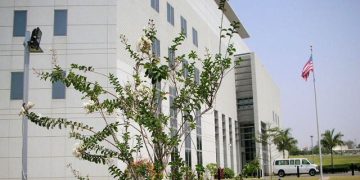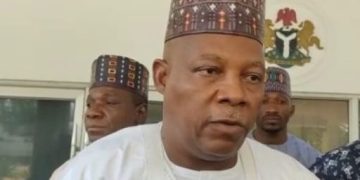The African Development Bank (AfDB) has stated that it is committed to working with the Federal Government and stakeholders towards recharging of water to the Lake Chad Basin.
This was disclosed by the AfDB President, Akinwunmi Adesina, in a discussion with President Muhammadu Buhari at an ongoing COP26 conference in Glasgow, Scotland.
The Lake Chad basin has suffered from drought as it is a major source of livelihood for millions in the area.
The AfDB President, Adesina, said:
I had a great discussion with President Muhammadu Buhari at the COP26 in Glasgow.
I asked for his leadership to help on the recharging of water to the Lake Chad Basin. We will rally behind you.
The cost of inaction is greater than the cost of action. Thank you Mr. President.
READ ALSO: Tension In Abuja Over Planned Attack By Bandits
The Lake Chad basin has been a source of concern for the FG as the shrinkage has worsened the insecurity in the area.
The Federal Government disclosed that it will focus on three areas aimed at supporting Project Lake Chad (PROLAC), including Regional and National Coordination Platform and Local Capacity Building aimed at reinforcing regional dialogue and data collection and dissemination, institutional capacity building and others.
The focus areas would be Regional and National Coordination Platform and Local Capacity Building aimed at reinforcing regional dialogue and data collection and dissemination; Institutional capacity building and knowledge sharing, as well as Agriculture Investments and Value-Chain Development, aimed at promoting public productive investments; and Value-chain development, citizen engagement and community participation activities in project areas.
Minister of Humanitarian Affairs, Disaster Management and Social Development, Sadiya Farouq, stated that:
The Lake Chad Region faces a combination of multi-dimensional risk factors which deepen vulnerabilities.
From 2014, Boko Haram’s violent activities took on a transnational approach, spreading its terrorist attacks from Nigeria to Cameroon, Chad, and Niger. This has created a humanitarian crisis, increasing the number of internally displaced persons and refugees within the Lake Chad Region.”
















